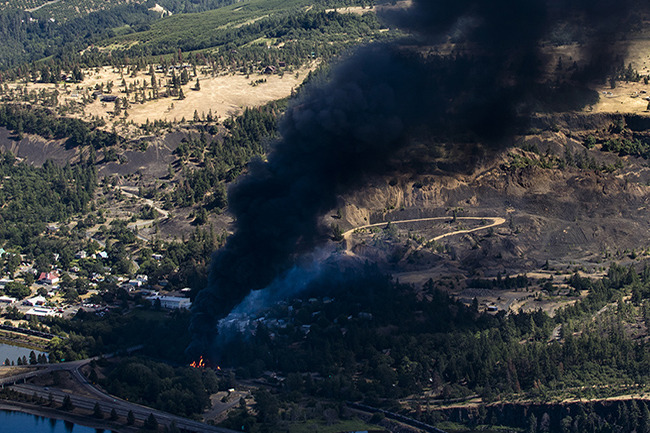Salem, OR — At the close of the 2017 session the Oregon Legislature has failed to pass legislation that would have improved oil train emergency response requirements and oil terminal review standards, including House Bill 2131.
“This is a big disappointment for our community,” said Arlene Burns, Mayor of Mosier. "One year has passed since an oil train derailed and caught fire in our town, and Oregon still has the weakest laws on the West Coast for oil train emergency responses and terminals. Last year’s derailment and resulting fire occurred just 600 feet from an elementary school full of school children. A rare windless day spared the school and the town from certain disaster. Our school kids and families, and all communities along the tracks deserve better protection from the next oil train derailment. The Legislature has let us down.”
“Oregon deserves meaningful and enforceable standards for oil train emergency responses and oil terminals,” said Dan Serres, Conservation Director of Columbia Riverkeeper, on behalf of the Stand Up to Oil coalition. “Across the region, communities like Mosier, Hood River, Portland and Vancouver have stood up to oil trains and terminals. The Legislature ignored these voices and bowed to pressure from the railroads, failing to pass bills that would protect our communities and our rivers.”
As originally drafted, HB 2131 would have required railroads to submit oil spill contingency plans for state approval, demonstrate their ability to meet the requirements of their plans, provide financial responsibility statements to state regulators and assess fees to the railroads. These concepts are required in Washington and California laws.
On May 25, HB 2131 was amended to prohibit public involvement and disclosure of oil spill plans, eliminate railroad fees for emergency response planning, remove standards for oil spill plans, and make those plans unenforceable. While the amended bill asked the railroads to show that they can pay the costs of a major derailment, these financial responsibility statements would have been hidden from the public and exempt from public records requests or court subpoena. Without any recourse to review response plans before an emergency occurs, the public would not find out if plans are inadequate until it’s too late.
“What started out as a good bill was amended to become a secrecy and ‘get-out-of-jail-free’ bill for the railroads hauling dangerous Bakken oil through Oregon,” said Michael Lang, Conservation Director of Friends of the Columbia Gorge. “Oil by rail will never be safe, but we look forward to working with the Legislature in the future to pass oil train legislation that better protects the Columbia River Gorge National Scenic Area and Oregon communities from oil trains.”
On June 30, the HB 2131 came to a vote in the Oregon House of Representatives, but was sent back to committee due to public outcry over the secrecy requirements for oil spill plans and financial responsibility statements. Rep. Barbara Smith Warner pledged to restore public disclosure to the bill. Rep. Mark Johnson (R-Hood River) and Rep. John Huffman (R-The Dalles) supported the bill’s secrecy requirements and opposed restoring public disclosure. At the close of the legislative session the leadership was unwilling to restore public disclosure and pass a meaningful bill.
###
Stand Up to Oil is a growing coalition of groups opposed to new oil terminals and an increase in oil transport through the Northwest.

